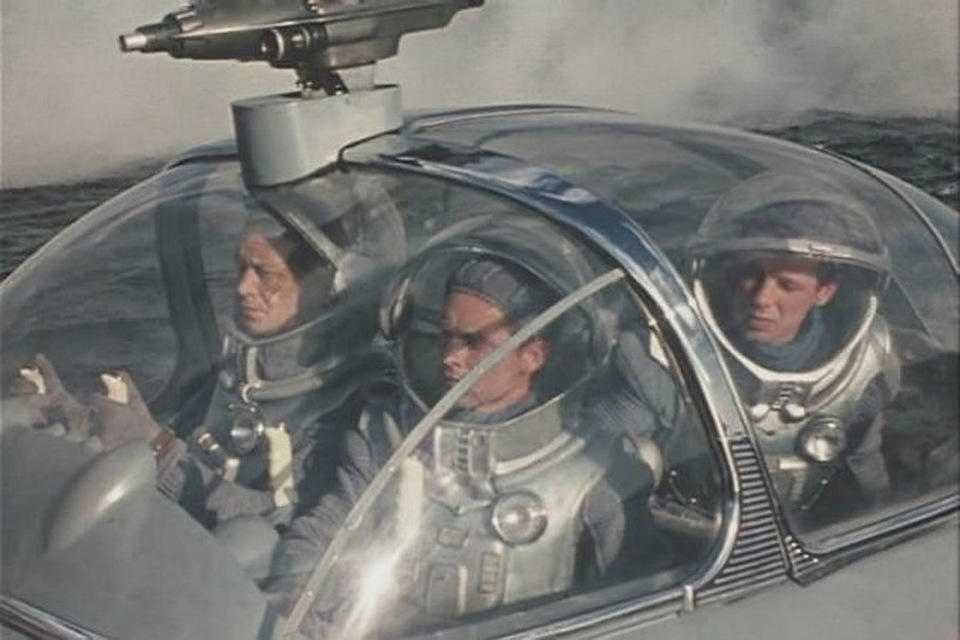
Reading an interview with American science fiction writers, I noticed that many of them, telling about the vivid impressions of their childhood, which determined the choice of the genre in which they create, recall the film “Journey to the Planet of Prehistoric Women”.
An enchanting spectacle in which scientific authenticity is organically combined with the poetry of distant wanderings and other worlds. Even now, sixty years after the shooting, the film looks without a skeptical grin, resembling a documentary report on events in parallel reality.
The story of this film is no less fantastic than the Venus jungle shown in it. The film was shot in 1961 in the USSR by director Pavel Klushantsev and was released under the name Planet of the Storms. After a triumphant rental in the USSR, the film was bought by the United States, re-edited, with the addition of new episodes, and released in the United States. Twice - as "Journey to the Prehistoric Planet" and as "Journey to the Planet of Prehistoric Women" - and did not go off the screens until the early eighties, exciting the imagination of a couple of generations of teenagers.
And in the USSR, the film was put on a distant shelf. The fact is that by the seventies, space had become unnecessary and inconvenient for the USSR authorities. The lunar race is lost, the development of the solar system is canceled. And the naive, optimistic books and films of the 60s, calling up, were put on the cloth.
I learned about the existence of the film by accident. From the UNESCO Courier magazine. This international magazine did not support the filtering system available to citizens in the USSR. And in the issue dedicated to world cinema science fiction, he mentioned the film “Planet of the storms”.
It was very surprising and a little disappointing to learn about the existence of a beautiful film that was no longer accessible to the Soviet citizen than the surface of Venus. However, this was only one of many disappointments from life in the USSR.
Before returning to the books, I want to add a couple of lines about the UNESCO Courier, which unwittingly made another breach in the Iron Curtain. In addition to all other prohibitions, in the USSR there was an unspoken ban on comics. Not strict, no - in the spread-out magazines “stories in pictures” were printed, somewhere on the sidelines there were books with illustrations on each page ... But the comic book in the Western sense - a long drawn story, with a characteristic presentation of information in the USSR did not exist.
With one small exception. UNESCO courier in the double for September-October 1976 published the first full-fledged comic in the USSR. A wonderful hand-drawn story about the adventures of a man traveling around the world of UNESCO. This issue was conceived and drawn in the form of a comic book specially for UNESCO Courier by 28-year-old French biologist Jean-Marie Clement, a molecular scientist research scientist, together with his wife Safura Asfiya, a geneticist by profession and an employee of the Iranian mission to UNESCO.
Unfortunately, I did not find this second-hand book rarity on the net, so I will limit myself to a cover photo. Maybe one of my readers has this issue and he will scan it - as a monument to those times when the world was young, UNESCO was not an empty phrase, and female genetics drawing comics worked in the Iranian representative office.

But, back to our sheep forbidding books. The fruit of their labors was the situation when I read all this science fiction of the “near sight” already at zero, as books appeared on the net. To shed a stingy tear - over the naivete of the beautiful-hearted dreamers. And over the malice of the censors who deprived me of this holiday in the years laid by nature.
In general, life in the USSR was full of disappointments for the reader. The Ural Pathfinder magazine, for example, annually conducted quizzes under the rubric of “My Friend Fantasy”, in which he mentioned books inaccessible to readers. Take, for example, and print a fragment of "Endless War" by Joe Holdeman - drooling dear reader.
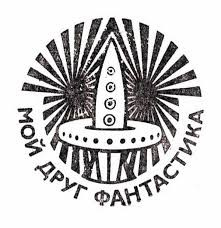
But even if the stars laid down so that the book was published in the USSR, this did not mean anything. Censors mutilated the book, removing slippery episodes, in their opinion. Sometimes they did it secretly - for example, removing from the book “The Day of the Triffids” beautifully translated by Arkady Strugatsky — an episode about their origin (yes, yes, they were made by Trofim Lysenko) and what exactly the “comet that blinded people” was (yes, yes , these were military satellites).
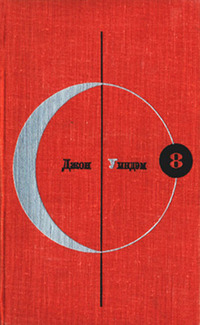
Other books censored obviously crippled. Clark’s novel "2001: A Space Odyssey" ended not with an explosion, but with a sob: "The last chapters of the novel are full of mysticism, which caused them to be cut off in the Russian translation" - with greetings Ivan Efremov.

Clark was generally lucky with dumb-headed censors - however, about how the publication of "Odyssey-2" in "Technique-Youth" was stopped, readers of Habr already read a wonderful article. The events described in it were not the only stop of the publication - for example, the print of the action-packed story in the magazine Koster was interrupted - in it a certain government agency zombified people, forcing them to kill famous politicians.
Now it’s clear that the censors were scared by the allusion to the alleged Kennedy killer Lee Harvey Oswald, who had lived in the USSR for a couple of years. But then, little I just did not get the continuation of an exciting story.
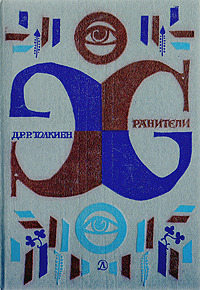
It was generally in the tradition of the USSR. Take, print for example, the first volume of the Tolkien Guardians, write at the end something like “Dear Reader, Gandalf may have survived” and that’s all. There will be no second volume - with the communist greetings of Glavlit. Well, or as in "Angelika" - "The authors have written several books about the further adventures of the Marquise of Angels" - but we will not let you read them, simply because.

The same thing happened with the movies. Star Wars was released - a film that became an event in art. Almost all Soviet newspapers in such epithets told about the film that I immediately wanted to watch. “Fights in space, robots, princesses, rebels, - in general, all-in-one“ we will never show this to you, although we ourselves have looked. ” As if this were not enough, they still inserted a fragment from Star Wars into the Soviet spy thriller “End of Operation Resident”. Because of this fragment, I went to the “resident" several times.
And enough about the sad. Despite fierce censorship and a strange pricing system that made it impossible to find good books for sale, the USSR was a reading country. Now, recalling my childhood, I recall the “Extraordinary Adventures of Karik and Vali” by Jan Larry about a fantastic journey along the front lawn of a brother and sister, which had been reduced to the size of insects.
By the way, from the illustrations to this book you can judge the changes in public morality. According to the author, the reducing agent of Professor Enotov acted only on living organisms, and not on their clothes. I was lucky to have a pre-war edition of this story, from the illustrations in which my classmates blew nose. Now, the book is illustrated like this:
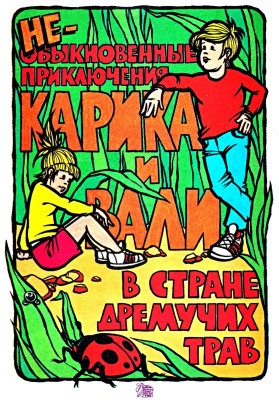
There were other books. There was “Five in a Starship” by Anatoly Moshkovsky, with magnificent drawings by Heinrich Valk (the very same as the illustrator “Dunno on the Moon”). In the story, five schoolchildren travel the universe in a spaceship.
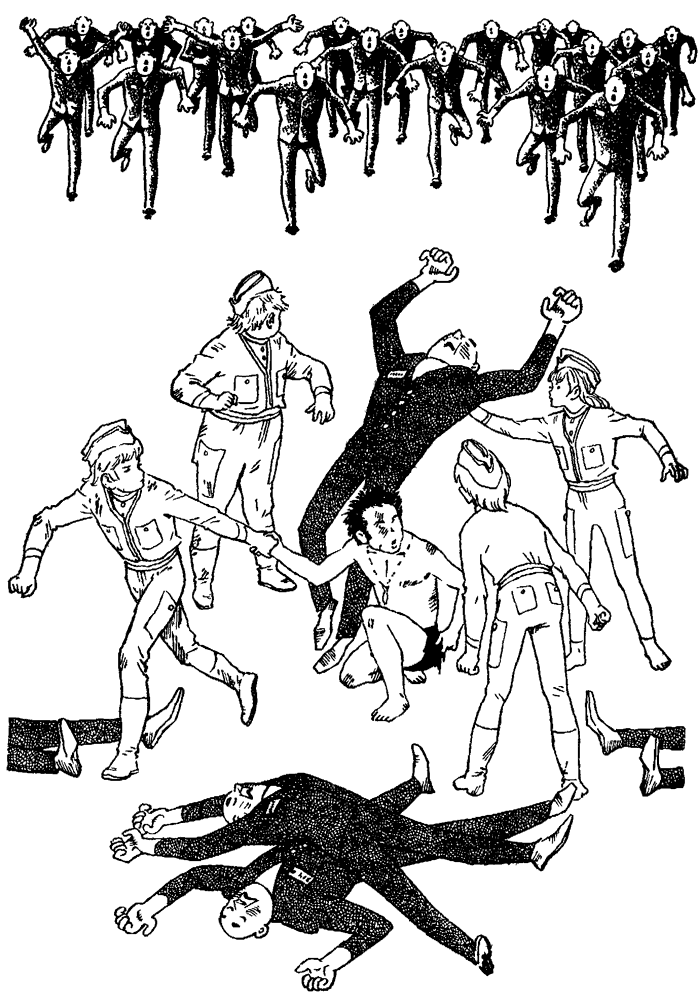
There was, for example, “Half Life” by Kira Bulychev. A short story about how earthlings, having discovered a dead starship of unknown civilization flying to nowhere, decide to deliver it to Earth. But, sparing energy for towing, they send the find under their own power, under the supervision of Dr. Pavlysh. Which, bypassing the premises of a dead ship, discovers a notebook lying on the floor, with notes in Russian. A simple beginning, probably the best story of Soviet science fiction in general. Somewhere on nine, on a five-point scale.
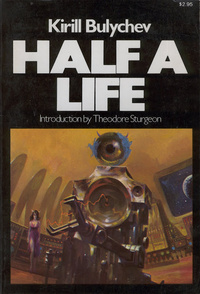
There was the “Function of Shorin” by Georgy Gurevich, which went down in history, probably the most ridiculous physical mistake I met: when accelerating a ship to the speed of interstellar flight:
Not time slowed down - the processes changed: physical, chemical, biological, and each according to its own law. The harder the process, the harder the changes..
It is true that the mass grew, things became more massive, moved more slowly. Hands and feet, spoons and devices, muscles of the eye and ions in the nerves moved slower, visual impressions gathered more slowly, reports to the brain and orders from the brain slowed down, blood in the veins and molecules in the cells moved slower.
Chemist Vagranyan was the best gymnast in the crew. He twisted the sun on the horizontal bar so that few would equal it on Earth. But then he burned his hand, for two weeks he did not approach the shells. Finally, he recovered, ran to the gym, jumped on a run to the tourist ... and fell screaming. His muscles were torn in his hands, could not stand the weight of his body
At the same time, a good story. Strong I also want to add an interesting touch to the portrait of the author. Often I see articles on Habré in which readers who are going to live forever discuss the medical process of counteracting aging. Here are Gurevich’s thoughts on this matter.
If you succeed, you can consider him a pioneer.
So, our ancestors had to produce a dozen children to maintain the species. Consequently, the human minimum of life was as follows: 16–18 years old to adulthood, 20–30 years old to give birth to a dozen children, and another 15 years to raise the last. Total: 50–65 years.
But, continuing the discussion, all that is appropriate should be provided biologically. The animal needs to see - the organ of vision appears, you need to run - legs are formed. If it is necessary to remove generation after generation in a timely manner from the stage, organs for switching off life must be laid. It is impossible to let such an important thing go by its own accord.
What is it? Is old age suicide?
These are the thoughts I developed about 30 years ago, somewhere in the end of 1958. I spent a week outlined. The plot was not yet, the article turned out. And I carried it to Knowledge-Power, told the editor with immodest naivete: “Lev Viktorovich, I offer you material that will be remembered for fifty years.”
And Zhigarev (I write out my name with pleasure. Here was the editor, I was not afraid of any trouble, if only the magazine would be more interesting) ... so, he undertook to break through the article.
Eight reviewers were the most daring. Six remained silent, two gave a positive review: science fiction writer Efremov and scientist-physicist Chmutov. And the article came out ... in the September issue. And I, naively immodest, expected that from that September the struggle for multiple youth would begin, a decisive attack on old age, the retreat of death.
Letters rained down: from the sick, from old women, from restless mothers, from teachers and village doctors, from eccentrics and an eccentric, collecting eccentrics. (A collection of eccentrics. Also a topic!) Only the experts were silent. Not a single one answered.
If the mountain does not go to Mohammed, Mohammed goes to the mountain.
It was in those years in Kiev that a special institute of longevity was organized. I sent an article there. Correspondence lasted about a year, scientists doubted whether the authority of the scientific institution undermined the discussion of the amateur’s article. But in the end I was invited to make a report at the scientific council.
You can imagine how I was preparing, how I thought over the options for the discussion five moves ahead: “I will say, they will object, I will refute, they will answer me, and then I will answer ...”
And how he trembled in his heart: what if these scientists know something so mysterious that they don’t get into print, which I missed, a student of library catalogs.
- Well, why did you come to us? Asked the deputy director. He seemed to suggest that I was collecting references for a dissertation.
I replied: “I brought you a hypothesis, brought the idea of research. You have a lab. It is necessary to set up experiments. What kind? Let's discuss". He objected:
- We have approved a plan. We have urgent tasks. Old people knock on us with their senile diseases. They need help first.
I thought that the best help would be the abolition of old age, the return of youth. But is it possible? The deputy director doubted. To convince him, it was necessary to rejuvenate someone, and to rejuvenate, to convince to conduct research at the institute. And the circle closed. The Institute considered urgent treatment of senile diseases.
This is not the first time that a bird in their hands is preferred by a crane in the sky. Even those whose duty is to catch cranes.
That's how I met with the flip side of the high specialization of science. After all, the Kiev Institute was created for the sake of human longevity. However, the term “longevity” sounds somehow frivolous, immodest, and arrogant. They preferred to call the Institute of Gerontology. But what is gerontology? The science of old age. This opened up the possibility of an unlimited and indefinite study of everything related to old age: senile change in teeth, skin, hair, graying, baldness. And the main thing disappeared behind the details: the cause of old age, especially since it hides at a different age - even before old age.
Perhaps over the past thirty years the situation has not changed. Here lies before me a purely scientific book, recently published. It says that science has tactical, strategic and super-strategic tasks. The tactics in the problem of lengthening life are the fight against road accidents and premature old age, the strategy is the fight against cancer, heart disease, diabetes and others, in order to approach biological longevity - to 88 years (150 have already been removed from the agenda). Superstrategy, on the other hand, is a radical change in life that is not well founded and it’s too early to think about it; this is a matter of the distant future, the middle of the 21st century, at best.
But, continuing the discussion, all that is appropriate should be provided biologically. The animal needs to see - the organ of vision appears, you need to run - legs are formed. If it is necessary to remove generation after generation in a timely manner from the stage, organs for switching off life must be laid. It is impossible to let such an important thing go by its own accord.
What is it? Is old age suicide?
These are the thoughts I developed about 30 years ago, somewhere in the end of 1958. I spent a week outlined. The plot was not yet, the article turned out. And I carried it to Knowledge-Power, told the editor with immodest naivete: “Lev Viktorovich, I offer you material that will be remembered for fifty years.”
And Zhigarev (I write out my name with pleasure. Here was the editor, I was not afraid of any trouble, if only the magazine would be more interesting) ... so, he undertook to break through the article.
Eight reviewers were the most daring. Six remained silent, two gave a positive review: science fiction writer Efremov and scientist-physicist Chmutov. And the article came out ... in the September issue. And I, naively immodest, expected that from that September the struggle for multiple youth would begin, a decisive attack on old age, the retreat of death.
Letters rained down: from the sick, from old women, from restless mothers, from teachers and village doctors, from eccentrics and an eccentric, collecting eccentrics. (A collection of eccentrics. Also a topic!) Only the experts were silent. Not a single one answered.
If the mountain does not go to Mohammed, Mohammed goes to the mountain.
It was in those years in Kiev that a special institute of longevity was organized. I sent an article there. Correspondence lasted about a year, scientists doubted whether the authority of the scientific institution undermined the discussion of the amateur’s article. But in the end I was invited to make a report at the scientific council.
You can imagine how I was preparing, how I thought over the options for the discussion five moves ahead: “I will say, they will object, I will refute, they will answer me, and then I will answer ...”
And how he trembled in his heart: what if these scientists know something so mysterious that they don’t get into print, which I missed, a student of library catalogs.
- Well, why did you come to us? Asked the deputy director. He seemed to suggest that I was collecting references for a dissertation.
I replied: “I brought you a hypothesis, brought the idea of research. You have a lab. It is necessary to set up experiments. What kind? Let's discuss". He objected:
- We have approved a plan. We have urgent tasks. Old people knock on us with their senile diseases. They need help first.
I thought that the best help would be the abolition of old age, the return of youth. But is it possible? The deputy director doubted. To convince him, it was necessary to rejuvenate someone, and to rejuvenate, to convince to conduct research at the institute. And the circle closed. The Institute considered urgent treatment of senile diseases.
This is not the first time that a bird in their hands is preferred by a crane in the sky. Even those whose duty is to catch cranes.
That's how I met with the flip side of the high specialization of science. After all, the Kiev Institute was created for the sake of human longevity. However, the term “longevity” sounds somehow frivolous, immodest, and arrogant. They preferred to call the Institute of Gerontology. But what is gerontology? The science of old age. This opened up the possibility of an unlimited and indefinite study of everything related to old age: senile change in teeth, skin, hair, graying, baldness. And the main thing disappeared behind the details: the cause of old age, especially since it hides at a different age - even before old age.
Perhaps over the past thirty years the situation has not changed. Here lies before me a purely scientific book, recently published. It says that science has tactical, strategic and super-strategic tasks. The tactics in the problem of lengthening life are the fight against road accidents and premature old age, the strategy is the fight against cancer, heart disease, diabetes and others, in order to approach biological longevity - to 88 years (150 have already been removed from the agenda). Superstrategy, on the other hand, is a radical change in life that is not well founded and it’s too early to think about it; this is a matter of the distant future, the middle of the 21st century, at best.
There was also a puppet cartoon whose name I have been unsuccessfully seeking for a couple of decades. Animals living in the forest build a spaceship - a classic multi-stage rocket. Which fell into the swamp. But friends from other forests come to their aid and the next rocket successfully delivers an international crew to the surface of the moon.
At the end of the film, the heroes flee from the terminator line, fleeing the onset of an icy moonlit night. And they fall to Earth, falling from the crescent moon. I remember this terribly upset. Such a scrupulous scientific cartoon and such a finale.
“When I grow up, I will write my book about flying to the moon,” I remember, “I said,” which will end normally, starting from the moon on a rocket, and not this phantasmagoria.
And he kept his word. But, by the way, you already know that.
Scene after credits:
Why did I write this article? For the sake of advertising, of course. On a habr all advertise everything - and I am no exception. I used to advertise myself, but since my next book, a translation of the first part of Peter Hamilton’s Salvation, will be released closer to the new year, I decided to advertise the game.
Traditionally, I’ll start from afar. For the past 25 years I have been playing "Heroes of might and magic 2" - first on a computer, then on the phone (There is an excellent free port "Free Heroes 2") For my son, this is a game of all his life - he plays it literally from two years old.
The game is good, but, let's say, too easy. Well, or so it seems to me after 25 years of training. I, like horror flying on the wings of the night, arrange armageddon for legions of enemies by jumping along a chain of teleporters of cards thoroughly studied. And I do not like giveaway games. I’m not a Stranger to you, after all.
Therefore, I was pleased to find in the Google Play "Braveland Heroes" - a game with similar gameplay and mechanics. And with pleasure I share the joy of finding with the community. Yes, the game is not without flaws. The graphics could have been better. The balance between paid and free players - could be thinner. (He could have been at all). But playing is interesting. Without even paying - you can move along the plot, courageously overcoming difficulties.
In general - my recommendation. And most importantly - my son is depressed that in the Clan "Waterbread" I created - there are only two people. He and I. What I complained about.
- Clan membership is helpful! - he said, - you can share resources, beat bosses together ... But no one comes to us, because no one knows about our clan.
“This is a solvable problem,” I said, “as always, I have a plan on how to fix it ...”
Traditionally, I’ll start from afar. For the past 25 years I have been playing "Heroes of might and magic 2" - first on a computer, then on the phone (There is an excellent free port "Free Heroes 2") For my son, this is a game of all his life - he plays it literally from two years old.
The game is good, but, let's say, too easy. Well, or so it seems to me after 25 years of training. I, like horror flying on the wings of the night, arrange armageddon for legions of enemies by jumping along a chain of teleporters of cards thoroughly studied. And I do not like giveaway games. I’m not a Stranger to you, after all.
Therefore, I was pleased to find in the Google Play "Braveland Heroes" - a game with similar gameplay and mechanics. And with pleasure I share the joy of finding with the community. Yes, the game is not without flaws. The graphics could have been better. The balance between paid and free players - could be thinner. (He could have been at all). But playing is interesting. Without even paying - you can move along the plot, courageously overcoming difficulties.
In general - my recommendation. And most importantly - my son is depressed that in the Clan "Waterbread" I created - there are only two people. He and I. What I complained about.
- Clan membership is helpful! - he said, - you can share resources, beat bosses together ... But no one comes to us, because no one knows about our clan.
“This is a solvable problem,” I said, “as always, I have a plan on how to fix it ...”